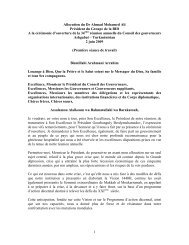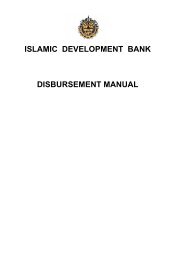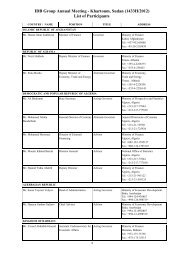Mauritania - Islamic Development Bank
Mauritania - Islamic Development Bank
Mauritania - Islamic Development Bank
Create successful ePaper yourself
Turn your PDF publications into a flip-book with our unique Google optimized e-Paper software.
18<br />
rooted harmful traditional practices (e.g.<br />
female genital mutilation, food taboos etc)<br />
negatively affect the health-seeking behavior<br />
and ultimately, accessibility to health services.<br />
• Chronic malnutrition rates have stagnated<br />
and remain a serious problem in rural areas<br />
among the poorest and the very young (0-3<br />
years) who are the most vulnerable.<br />
2.3 Government’s Strategy for the Health<br />
Sector<br />
64. The PRSP-III identifies the development and<br />
implementation of a clear and coherent policy<br />
as one of the top priorities of the health sector<br />
for the next five years. The sector strategies and<br />
poverty reduction plans highlighted the need to<br />
increasing funding to address healthcare access<br />
and quality, human resource needs, awareness<br />
and monitoring and evaluation.<br />
65. The forthcoming CSLP-III (2010-2015),<br />
envisages developing a strategy whose objectives<br />
focus on four strategic areas: (1) improving<br />
universal access to health services and quality<br />
nutrition, (2) strengthening of the fight against the<br />
disease (3) developing mechanisms for financing<br />
health and (4) leadership development, good<br />
governance and sector performance. This strategy<br />
will enable to (i) reduce the overall mortality<br />
and morbidity, particularly IMR and MMR (ii)<br />
reduce the total fertility rate; and (iii) mitigate the<br />
impact of epidemics including endemic HIV/AIDS<br />
and emerging diseases (iv) reduce hunger and<br />
malnutrition in the population, especially among<br />
vulnerable groups (v) strengthen community<br />
participation in development and management<br />
strategies for access to basic health services, and<br />
(vi) enhance coordination and planning within<br />
and across sectors.<br />
66. Donors and specialized agencies remain<br />
skeptical about the Government’s commitment<br />
to implement the strategy in terms of the level,<br />
equity and allocative efficiency of spending.<br />
Inadequacy of financial support to the WHO for<br />
preparing a health sector policy is worrying in<br />
this regard. Also available PRSP III documents do<br />
not specify the amounts of future funding to the<br />
health sector.<br />
2.4 Proposed Interventions (with Donors) to<br />
Help Government Meet its Goals<br />
67. Scaling up of direct IDB Group support<br />
for primary health care, and a partnership<br />
with donors on health initiatives, are the two<br />
elements for IDB Group support to enhance<br />
access to quality health services and ultimately,<br />
impacting the high IMR and MMR in <strong>Mauritania</strong><br />
though a financing envelope of US$150 million.<br />
Building partnership, and synergy with donors<br />
68. Support to the initiative for preparation of<br />
a national health sector policy and the proposed<br />
five-year plan currently under preparation by<br />
the WHO. In addition:<br />
(i) Support the Expanded Immunization Program<br />
to redress shortcomings in the coverage rates<br />
with a direct impact on the infant mortality<br />
rate in cooperation with UNICEF and GAVI;<br />
(ii) Adopt and expand the successful AFD user’s<br />
fees initiative to enhance access to quality<br />
health services for pre- and post-natal care in<br />
priority remote areas.<br />
Scale up of the direct IDB Group support for<br />
Health<br />
69. Support for the extension of the Primary<br />
Health Care (PHC) and secondary health care<br />
services in the high poverty areas would enhance<br />
access to quality services by investing in training<br />
and retaining of basic health staff and community<br />
volunteers (e.g. midwifes, nurses, community<br />
promoter etc), procurement of equipment, other<br />
essential health commodities and construction of<br />
PHC facilities.<br />
2.5 Suggestions and Recommendations for the<br />
Government<br />
70. The situation in <strong>Mauritania</strong> shows that<br />
the implementation of interventions under<br />
the human development pillar requires policy<br />
and institutional reforms. In this regard, the<br />
government strategy should be strengthened<br />
through the following actions:<br />
• Preparing and implementing at the earliest<br />
opportunity a health system development<br />
MCPS for <strong>Mauritania</strong>, 2011-2015






